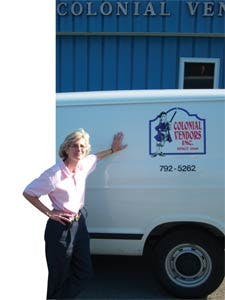Larger companies have certain advantages over smaller competitors in today’s vending industry: volume-based buying discounts, more services to offer, more opportunities for employee advancement, and more capital for investment. But that doesn’t mean the small independents can’t win their share of the business.
Case in point: Colonial Vendors Inc., a 5-route operation serving a 30-mile radius in Danville, Va., a city of 50,000 in Southern Virginia. The company, founded in 1949, has held onto many of the area’s largest accounts and remains a formidable competitor in today’s volatile vending market.
Under the leadership of Pamela Martel, whose family has owned the company since 1983, Colonial Vendors has been able to fight larger competitors by providing good customer service. Maintaining top quality service requires ongoing investment in personnel, equipment and an aggressive focus on profitability.
Martel, a 47-year-old woman with the energy of a teenager, believes the small independent vendor with the right organization and a commitment to good service has a solid future. “There’s a need for small independent vending,” she said. “You need the independents out there to keep the large ones honest.”
Having the right organization begins at the top, and in Martel’s case, this consists of a first-hand understanding of every job in the organization, a willingness to set an example for others, a genuine concern for her co-workers’ happiness, and ongoing education in the business. She gained these qualifications through experience, driven by self motivation.
Martel has proven that a determined individual, armed with the right resources and a little bit of luck, can still succeed in automatic merchandising.
An unlikely career
Vending was not the most likely career for Martel, a Southern California native who relocated to Virginia as a youngster and majored in marketing at Virginia Tech in Blacksburg, Va. While she grew up in a family of high achievers, her parents did not become business owners until later in life.
Martel’s exposure to the foodservice industry began several years after her parents purchased a restaurant in Richmond, Va. while she was still in college. Her parents bought the restaurant when her father left his executive position and the corporate world.
After graduating from college, Martel worked in sales for some big companies, including Procter & Gamble Inc. and Otis Spunkmeyer. In 1983, her parents decided to buy Danville Vending when the founder of that company was looking to retire. At that time, her parents asked her to manage their restaurant for them so they could move to Danville and run their newly-acquired vending business.
Martel welcomed the chance to work in the restaurant. While she was successful in her previous sales positions, she was never completely happy with the corporate business world. “I’m a physical person,” said the self-described tomboy, who is more comfortable in blue jeans and sneakers than business suits and high heels.
Learning from the ground up
Three and a half years later, her parents needed her help with the vending business. The vending industry was growing in the early 1990s, but Danville Vending wasn’t keeping pace with the competition. Her parents changed the name to Colonial Vendors, hoping to expand beyond the Danville market.
Martel knew very little about vending when she came on board with the newly created position of sales and marketing manager. Her parents wanted her to bring in new business, so to prepare herself, she began learning the operation from the bottom up. She rode with the drivers and spent time in the service department learning about equipment.
Martel realized quickly that the operation wasn’t being run efficiently. While the drivers were all long-time veterans, there was little oversight of what they were doing. There was little route accountability. Her parents had also made it a practice of buying used equipment to save money.
Martel established procedures for machine cleanliness. She noted that being a woman, she brought a stronger sense of cleanliness. The drivers were impressed with her willingness to do the job herself, and they listened to her.
“I gained their respect,” she said.
She ran routes every time a driver was off for illness or vacation, a practice she continues to the present day. “It lets me see what’s going on,” she said.
She launched the use of new equipment, and introduced cold food machines and OCS, which the company had not previously offered. This necessitated adding coolers to the delivery vehicles. These offerings naturally made the company more competitive.
An uphill struggle
Winning new business didn’t come easy, however. There were some long established vending players in the market at the time, including Tom’s Foods and Lance.
While Martel had previous sales experience, selling vending was a longer term process than consumer goods. Through her persistence, she did manage to win new accounts. She focused on larger customers, and signed the company’s first accounts that required on-site attendants.
Martel admitted that being a tomboy by nature, she is not a natural sales person. But if she believes in a product, she can sell it. She learned this working for Otis Spunkmeyer when it was introducing freshly made cookies to retailers. Hence, she made it a priority to make sure the service she represented was the best in the market.
Martel also wanted to improve route density. “It wasn’t being run efficiently,” she said.
The veteran drivers were reluctant to increase their work loads, however. “It was hard for them to change their ways when they have been here for so long,” she said.
A fortuitous acquisition
In the late 1990s, a regional competitor bought the largest independent in Danville. Since several of Colonial Vendors’ drivers were retiring, this change proved fortuitous. Two route supervisors and one driver from the larger independent did not want to join the regional company. Preferring to work for a local company, they gladly replaced the retiring drivers at Colonial Vendors.
The timing was a stroke of luck for Martel, who by this time was wearing several hats. In addition to sales, she was acting as route supervisor. The new drivers were experienced in handling larger work loads. “It’s nice having people who know what they’re doing,” she said.
The new drivers, in turn, welcomed the chance to work for an appreciative employer. (See sidebar, page 40).
Colonial Vendors soon became the leading independent in the market, a point of difference that Martel often uses to her advantage against the nationals and large regionals.
The company’s vending routes were able to service more accounts, improving return on assets. As Martel’s learning curve accelerated, the company was able to build market share through the new millennium.
She was able to eliminate attendants in some accounts by introducing dollar coin payout. She noticed that dollar coin payout increased sales.
New challenges arise
In the meantime, the local economy became more challenging as manufacturing locations continued to downsize. In 2005, Martel faced a new set of challenges when her parents announced plans to retire.
Martel agreed to buy the company, but she immediately had to wear more hats. Her mother had been the office manager while her father oversaw the purchasing function.
Martel knew she needed an office manager, but she wasn’t sure she would be able to find the right person. One attempt prior to her parents’ departure had failed. But again, luck would come her way.
An acquaintance referred her to Charlene Harris, who had owned several restaurant franchises in the area and was looking for a new opportunity. One of Harris’ restaurants had been a Colonial Vendors’ customer.
Harris was unable to maintain her restaurant operation after her husband passed away. She had 34 years of foodservice management experience.
“We just meshed,” Martel said of Harris. The two women complement one another’s roles well. Where Martel tends to be reserved, Harris is more assertive. Harris initially came on as the office manager, and quickly expanded her role to operations manager. Having her own catering business, she also gave Martel the expertise and opportunity to offer catering as a value added service.
Harris misses some of the people she used to work with, but she prefers working with the team at Colonial Vendors. “People are hard to manage,” she said for the U.S. work force in general. “The work ethic just is not there.” The team at Colonial Vendors is exceptionally dedicated, she noted.
Advantages of an owner/operator
Being an independent, Martel has the advantage of having a personal relationship with all of her accounts. The company’s average account has 150 to 200 people.
Martel has been able to understand account needs without investing in expensive software. For example, she realizes that most of her accounts prefer regular size snacks to large size bags. Some competitors provide large size bags because they are not in touch with customers.
She has also carefully watched the acceptance of “better for you” products. Like most operators, Martel has been asked for “healthier” products by account managers. In response, she introduced products that meet nutrition guidelines and offered them in the machines.
Martel took a more “hands on” approach to this issue than many operators. In one account, she held a meeting with employees and management where she asked the employees to tell management what they wanted in the machines.
The level of consumer acceptance to “better for you” products has been slow, she said, but it has been rising. She specifically noted the growing response to Nutrigrain bars, Nature’s Valley bars and baked chips.
Customized service
In one account, Martel recognized the opportunity to improve the aesthetic appearance of the vending bank by installing a decorative header over the machines. She assumed the full cost for designing, producing and installing the header, which carries the account’s logo in big letters.
A strong, motivated staff has enabled Colonial Vendors to establish a reputation for good service. But as operating costs have increased and locations continued downsizing, competitive pressures have reached an all time high.
The only segment to continue to grow has been OCS. Martel recently found single-cup brewers to be a great selling tool.
Competitors continue to offer customers more incentives, she noted. These include signing bonuses, higher commissions, more frequent special events, and lower prices.
She lost one account to a competitor who offered an ice maker and lower coffee prices. “It’s just getting out of control,” she said. “I will not operate that way. I will not just buy an account.”
Martel has noticed that some competitors have been offering lower prices on certain products. She recently lost a long-time account to this tactic, which annoyed her when she realized the competitor was charging higher prices on other products.
Creative cost savings
Martel has looked for ways to cut costs in order to minimize the need for additional price increases. She has reduced deliveries in some accounts by doubling up on the fast selling items and reducing machine inventory.
She has also saved costs by recycling cardboard waste, washing uniforms in-house instead of sending them to a laundry, and cleaning the premises herself instead of paying a janitorial service. “I’m looking at internal ways to cut rather than raising prices,” she said.
She has been able to save money on some products by going to Sam’s Club, which recently opened a store in her area. She also joined the Vendors Purchasing Council, a buying cooperative, which has helped her save on product costs.
Exploring expansion opportunities
Martel has been considering expanding into cold beverage vending. This would represent a big investment, but it could prove more lucrative than her current practice of having the bottlers service machines in exchange for a commission. She said the bottlers have lowered her commission while raising their prices.
Martel is also considering expanding into water service and water filtration.
In order to grow the business, Martel will need to expand her geographic reach, which will require an investment in equipment and personnel. This is a tough decision, since she must consider the rising cost of fuel.
She has been asked by one of her customers to service a location 30 miles away. She reasons that she would need to add more locations in that vicinity for the expansion to be cost effective.
Future belongs to technology
Martel believes that remote machine monitoring is one way to expand cost efficiently, and she is currently exploring one system that she came across at an expo. This will enable her to schedule service more efficiently, and it will give her a better idea on what products are the best sellers. Receiving machine malfunction alerts will also be helpful in preventing costly ice cream melt downs.
Martel has been asked to add remote machine monitoring by a vending management company that she works with.
She is also considering expanding into cashless transactions. Like many of her colleagues, she is waiting for the cost of processing credit transactions to come down.
The choices confronting the small operator today have become more challenging. This past year, Martel joined the National Automatic Merchandising Association, which has exposed her to some helpful knowledge sources.
Martel claims that being a woman has its disadvantages in automatic merchandising. “It’s so irritating to go to these conventions and have people ignore me,” she said.
Being a female owner, Martel is certified to bid on certain government contracts, but this has not proved helpful in her situation. There are not many government facilities in her market.
In the meantime, she enjoys the challenges, and she expects to be in business for at least another 20 years. “It’s something new every day,” she said. She is confident that the economic challenges she faces today will pass. “You just have to hang in there and be tough,” she said. “The economy goes in cycles.”
Small firm attracts, keeps top talent
Colonial Vendors Inc. has proven that small operators can attract and keep top quality employees. All four of the company’s vending drivers previously worked for larger companies and two were route supervisors.
The company provides and cleans uniforms, pays full health insurance for single employees (partial coverage for families), bonuses and paid vacations. More importantly, the employees feel they are given the freedom to do their jobs as they see fit, and they respect management.
“You want to be treated the way you would treat other people,” said Denny Shields a 13-year route veteran who formerly worked as a route supervisor at a larger company. “There’s not a lot of pressure to do the job at a certain time and a certain way. As long as you get the job done efficiently and carefully.”
Shields said the team atmosphere is a great motivator. “Everybody pitches in and works together,” he said. This goes for the owner, Pamela Martel. “She gives 110 percent,” he added.
Danny Raynor, a 33-year veteran and also a former route supervisor, likes the relaxed atmosphere at Colonial Vendors.
“Pam is a great boss,” said Garry Isom, a 38-year veteran. “You work the way you want to work.”
Both Isom and Raynor turned down positions with a larger operation to work at Colonial Vendors.
All of the drivers are concerned about the slowdown in sales. “People are really holding onto their money because of the gas prices,” Raynor said. All agreed that this is the most challenging time they have ever witnessed.
Profile: Colonial Vendors Inc.
Headquarters Location: Danville, Va.
Founded: 1949
Owner: Pamela Martel
Number of Routes: vending, 1 OCS
Number of full-time Employees: 7
Annual Sales: Not revealed





